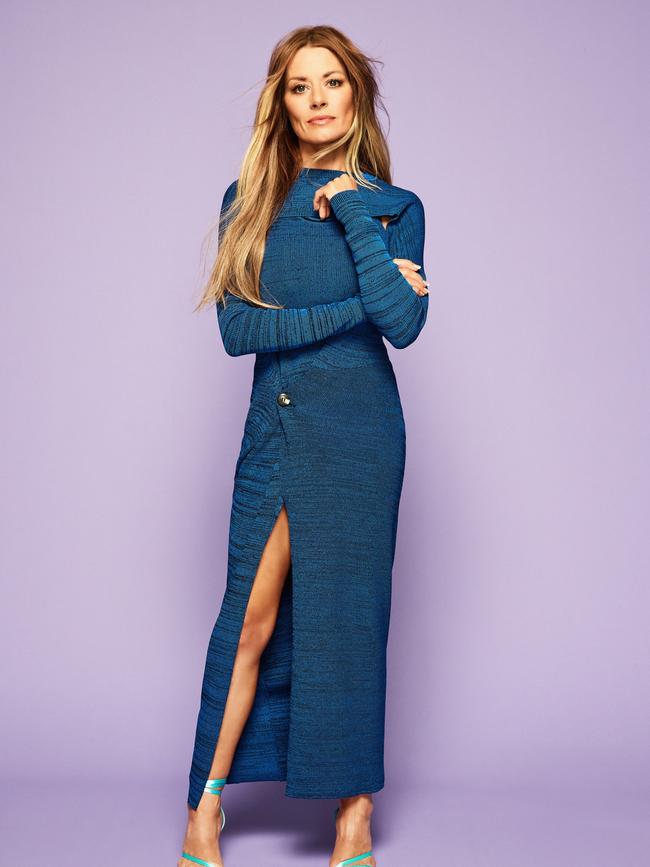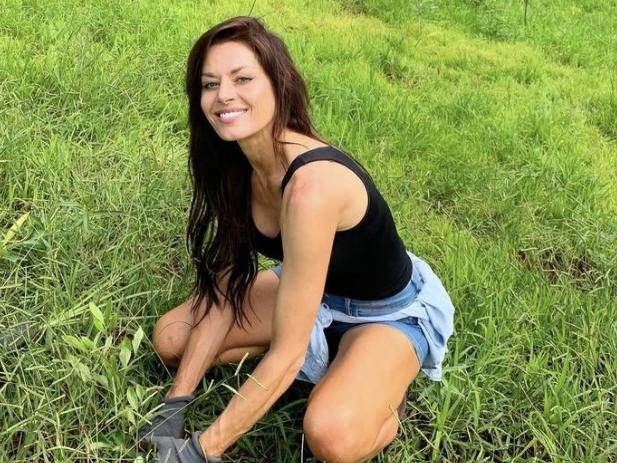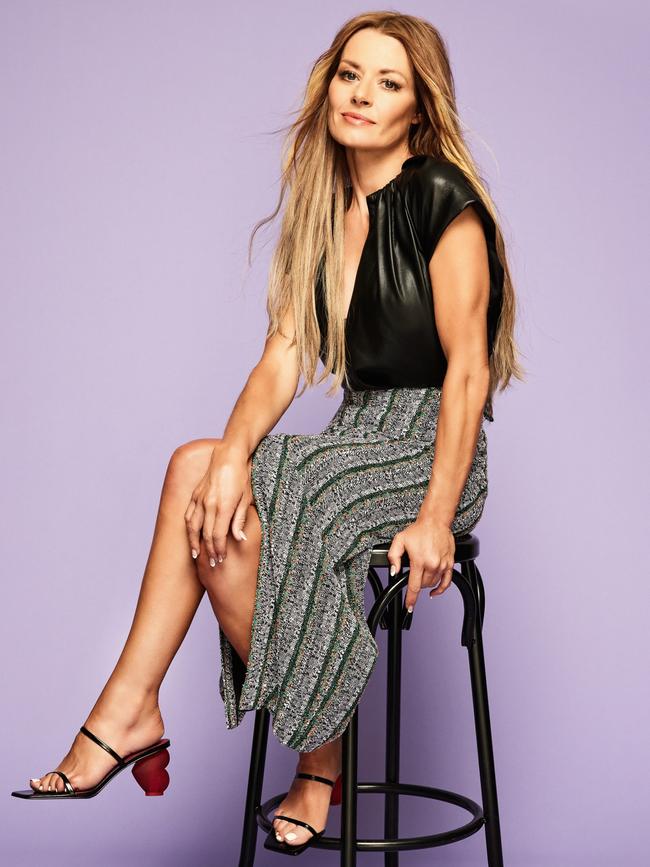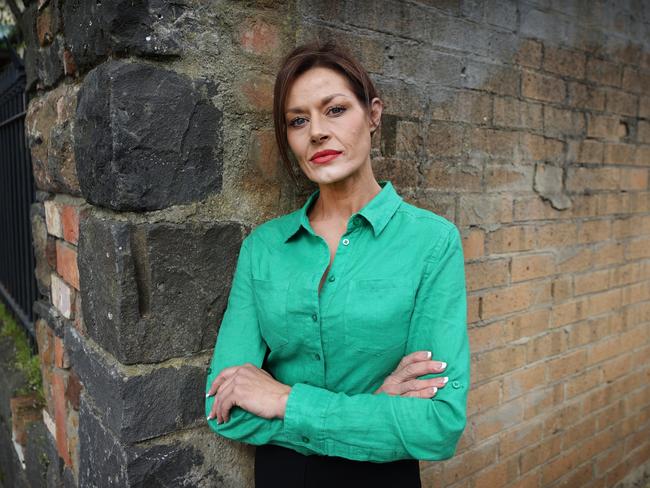Madeleine West reveals secret health battle
After going public with her childhood sexual abuse, former Neighbours star Madeleine West has revealed new details about her private mental torment. Warning: Graphic.
Stellar
Don't miss out on the headlines from Stellar. Followed categories will be added to My News.
The public healing for Madeleine West has begun. In January, the actor revealed she had been the victim of childhood sexual abuse and, as co-host of the podcast Predatory, she is speaking with survivors who have experienced similar trauma and consulting experts to warn listeners about those who prey on children.
Now, as West sits down with Stellar, she talks about expanding on her work as a child-safety advocate, coming to terms with her debilitating lifelong quest for perfectionism and, as a mum of six, setting healthy boundaries and having frank discussions with her children – while also knowing when to “say yes to life” and let them eat dessert for dinner.
Madeleine West has striven for perfection her whole life.
On the surface, it looked like the Australian star had it all: good looks, a great attitude and the ability to balance a successful acting career while raising six healthy children. But in a revealing interview with Stellar, she says it was all a facade.
For years, she starved herself, operated as a workaholic, struggled with relationships and was filled with self-hatred.
Her inner turmoil was caused by a secret she kept to herself for three decades: last month, the former Neighbours and Underbelly star revealed that she was sexually abused – sometimes daily – from the age of five to 10. Now she is bravely seeking to bring the “monster” who did this to her to justice.
As West, 43, explains, she is co-hosting the eight-part podcast Predatory with former police detective Gary Jubelin to help break down the stigma of talking and educating people about child sexual abuse.
In the series West wants to highlight the lifelong damage this horrific crime has on its victims.
“For every sexually abused person, what has happened to them will manifest in their life in some self-destructive behaviour,” she tells Stellar.
“They are never, ever to blame. What happened to them is a cross to bear.”

Many opt to block it out with drink or drugs, but West says her way of coping was to be the most perfect person she could be.
“My perfectionism is punishing,” she reveals.
“The need to be perfect, the good girl, has been impossible.”
She also wanted to take back control of her body, “which had been violated”. In her early teens, not long after the abuse stopped, West developed anorexia.
“My autonomy over my body had been snatched away, so to demonstrate I had some control over it I denied that most simple desire: hunger,” West explains.
“I just wouldn’t eat, then over-exercised. Pain and hunger made me feel something, because I had become accustomed to operating in a state of utter numbness.”
West says the anorexia went on for years.
“That control was so far-reaching, almost to the point of OCD [obsessive compulsive disorder],” she says.
“There was a big black hole inside of me, an emptiness, self-hatred, loss and mourning.”
West sought help for her eating disorder at the age of 15, and again at 18. At one point she was so skinny she was hospitalised for weeks.
“I nearly died,” West admits.
“[The eating disorder] nearly took my life.”
Getting help, she says, “started a period of self-reflection and working on myself”.
At the time, she avoided tackling the sexual abuse at the root of it all because it was too painful; she only embarked on that process five years ago.
LISTEN TO THE PREDATORY PODCAST
Therapy and her search for justice have helped improve her mental state, but West is understandably hyper-vigilant of adults in the lives of her children, who range in age from eight to 17.
“As a victim myself, I know the extreme level of damage it does to a person’s world view,” West explains.
“It’s not a happy place. It’s a dark place where the world wants to hurt you. It affects [your] capacity to hold down relationships, to hold down a job. I don’t want that for my children.”
She has been candid with them, offering age-appropriate explanations of what she endured. Even so, she stays alert.
“I’m watching out for if they have pains in the stomach or a reticence to spend time around a person,” West tells Stellar.
“I have open conversations about school, how they feel about their bodies. I say, ‘You can tell me anything.’”

West wants parents to understand that paedophiles are devious and can worm their way into families. Rather than meeting the outcast or oddball archetype, they can be funny, charismatic and well-liked in the community.
West says parents can protect their children by limiting how much information they share on the internet – a place she warns that an increasing number of children are falling prey to paedophiles without ever physically meeting them.
“Every parent can put their hand up and in their most candid moments say, ‘We use it as a nanny,’” she says.
“[But] predators thrive in this environment. We are giving our kids a gateway to all of that evil.”
Because she wants to protect more than just her own children, West reveals to Stellar that she recently joined forces with the e-safety awareness group Safe On Social to educate young people about online dangers.
As part of her role, she travels to schools around the country and overseas to conduct in-person chats.
“The talks are about what the laws are, what reporting looks like, [and] how they can protect themselves,” West explains.

“That opens the door to a lot of shared stories … Everyone has a story and an experience. What they are not so aware of is how to protect themselves.”
During it all, West has also taken on the most challenging role of her acting career.
In the stage adaptation of Megan Albany’s novel The Very Last List Of Vivian Walker – about a woman with cancer who creates a list of things to tick off before she dies – West portrays five different characters.
The opening night of the show’s tour kicked off last month, while she was juggling publicity for the podcast as well as builders at her flood-damaged Byron Bay home.
“This is the hardest role I’ve ever done,” she admits of the show, which is playing at venues around the country.
“But it has been the best therapy, an exercise in the thing I love doing most.”
Among the tasks Vivian sets herself are cleaning the fridge, tidying the playroom, organising her own funeral and updating her husband’s to-do list.
“It’s about finding joy in the little things and the emotions,” West says.
It’s a credo that she is trying to replicate in her personal life. West strives to be the best mother she can be, pack really good lunch boxes and take her brood on adventures. And if they want dessert for dinner, why not? As she says: “Say yes to life.”
As a committed environmentalist, she also works closely with her partner Maximo Bottaro, the CEO of non-profit ReForest Now, on regenerating rainforests.
“I’m lucky to have someone who is evolved and compassionate enough to go on this journey with me without sugar-coating or trying to avoid the tough moments,” West says.

Volunteering also helps to keep her mental health in check.
“When you suffer trauma you spend a lot of time in your head trying to find solutions,” she says.
“It’s good to help others, to enjoy the small things, which helps with healing.”
She’s also trying to have closer, more intimate relationships with her family, friends and loved ones.
“It will never be perfect,” West concedes.
“Before there was a part of me that felt I was never quite enough. Bad things happen to good people. That doesn’t have to define them. I’m finding a sense of wholeness and peace that was illusory for so long.”

For most of her life, she says, she was trying to run away from “the little girl with the blonde pigtails” who was abused.
“I blamed her for what happened because she was told she was wrong,” West says.
“She was happy, innocent, blameless. The world, for a long time, felt lacking. To secure happiness, I’ve learnt that it comes from within. It’s about looking in the mirror and liking who you see. It has taken a long time.
“I know I’m good enough. I’m the most perfectly imperfect version of myself – and that’s pretty bloody good.”
For more details about the Predatory podcast, go to predatory.com.au





